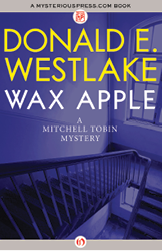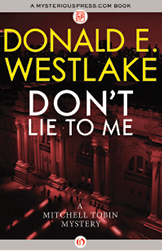Jade in Aries (24 page)
Authors: Donald E Westlake
I couldn’t believe I’d understood him. I said, “Do what?”
“Kill him.”
“Of course not.”
He gave a shrug. “You’re locked in with him,” he said, “just the two of you. It’s not an altogether stupid question.”
“Anybody with a key could get in there.”
“Anybody with a key,” he said, “is a customer.”
“I’m an employee.”
He glanced at me again, and patted the air to placate me. “Don’t get me wrong, I’m not saying we’d turn our backs on you. I just want to know the story, so I can proceed. Face it, a company like Allied gets men with a lot of different backgrounds. It wouldn’t be the first time there was trouble.”
“I didn’t kill him,” I said. “I didn’t know him.”
“Fine. Now I’ll turn it on.”
He did, and asked me questions, and I told him the night’s events, once again leaving out Linda. Goldrich, as I had told the truculent detective, was not my lawyer, he was Allied Protection Service’s lawyer, it was the company’s interest that animated him, not mine.
After he’d finished his questions and shut off the recorder, I said, “What about tomorrow night?”
“What about it?”
“Do I work at the museum or don’t I?”
“I wouldn’t know. You better call the company.”
“All right.”
We had nothing more to say to one another after that, and drove across Queens together in silence.
K
ATE WAS STILL UP
, watching an Andy Hardy movie on television. She switched the set off when I came in, and said, “What’s wrong?” She looked concerned, but showed no tension.
I’d had plenty of time to rehearse all this, compress it down to the juice. “There was a killing at the museum,” I said. “Nothing to do with me.”
“Did you see it?” Kate is a rawboned woman, thirty-eight years old, with the look about her of a pioneer wife. You could visualize her on the driver’s seat of a Conestoga wagon. She is calm but fast, with controlled strength, qualities that had made her perfect as the wife of a cop. In the last three years I’ve needed her even more.
I said, “No, I didn’t see it happen, but I found the body and called in the report. Linda Campbell was with me.”
It was only in the silence after I stopped talking that I realized this was the first time I had ever spoken Linda Campbell’s name in front of my wife. Kate knew the name, of course—the departmental red tape of my dismissal, along with Jock’s death, had made me a three days’ wonder in the newspapers at the time—but she had never before heard me say it.
I fought down the desire to defend myself, to assure her I hadn’t been seeing Linda before tonight. I said, “She came to me for help for her husband. She’d come here first, but didn’t have the courage to get out of the car and come ring the bell.”
Kate looked at me. I desperately wanted to read her face, but I could find no signs in it. She said, “When did she come here?”
“Tonight. And last night. And tonight she followed me to work.”
“Her husband’s out of jail?”
“He wants to go straight, and he’s having some trouble with old friends.”
“What could you do?”
“Put pressure in the other direction.” I nodded toward the hall phone. “I will, when we’re done talking.”
“Who was the dead man? One of the old friends?”
That was the question that told me she was hurt. I don’t know why. I was afraid to move closer to her, put my arms around her, for fear she would flinch; that had happened in the past, but not for a long time. I said, “No. It was nothing to do with her. And I’m nothing to do with her, Kate.”
She said, “It must have been very tough for you.”
“Seeing her again? It brought a lot of old aches out.” I had to push forward; I said, “I didn’t mention her to the police. They think I was alone when I found the body.”
She frowned. She truly didn’t know why I would have done that. She said, “What for?”
“Because of the past. The man was murdered by somebody. They’ll start looking into the past. If a woman was there, they’ll look into
her
past. If I say she was with me, they’ll look into my past.”
She said, “Then why tell me? Wouldn’t it be simpler just to forget it? Or do you have to see her again?”
“No, I don’t,” I said. “When I lie about her to the police, it’s to simplify my life and their investigation. But if I lie to you, I’m creating something where there isn’t anything.”
She looked at me with an expression that was a dim echo of the look she used to give Bill when he was small and she’d caught him in a not-particularly-terrible fib. She said, “Nothing at all?”
I remembered the unwanted sense of desire I’d felt when Linda had first come into the museum, but I also knew what my conscious mind wanted and what course I would be following, and I said, “Nothing at all. Not a trace.”
She didn’t exactly change expression, but her face softened somehow, and she nodded at the brown paper bag in my hand and said, “You didn’t even get a chance to eat your lunch.”
I welcomed the change of topic. “We can put it in the refrigerator, I’ll take it tomorrow night.”
“We could have a dinner together now,” she said, “if you’re hungry.”
“We could go out somewhere.”
“It’s after midnight.”
“Bill must know someplace open. Is he home?” Bill was sixteen, the age when most of his life was spent away from the house.
“He’s asleep. I’ll make something nice.”
She came toward me, reaching for the paper bag, and when I gave it to her our fingers touched. We both smiled at the same time, and I said, “You know me now.”
“Yes.”
We kissed, and she went out to the kitchen, and I headed for the hall phone, where I called a friend of mine still on the force, Marty Kengelberg. I had no idea what his duty hours were, but just took a chance. He wasn’t in, so I left my name, and went upstairs to change out of the uniform into slacks and shirt.
Kate made a production out of dinner. There was no real reason for it, since even with this all-night job of mine we still ate most of our meals together, but there’s always a kick in unexpected time off, an aura of playing hookey from the regular routine. Also, I think Kate had a feeling that some sort of milestone had been passed in the reconstruction of our life together, and wanted to mark it or to celebrate it. I myself was aware of greater complexities than that, but took pleasure in her pleasure.
We ate in the dining room, by candlelight, and afterward went upstairs to bed together and made love. Kate fell asleep very quickly, but I was keyed up by the night’s happenings, and was in any case on a schedule that wouldn’t have normally found me in bed before eight in the morning, so I was still awake a little after three when the phone rang. We have a bedroom extension, which I answered on the first ring, and it was Marty Kengelberg. I said, “Hold on while I switch phones.”
“Okay.”
I didn’t want Kate to wake up. I put on a robe, went downstairs, took the hall phone off the hook, hurried back up to the bedroom, hung up the extension there, dashed back down again, and said, “Marty? You there?”
“Listen, did I wake you up? The message said—”
“No, I was awake.”
“It said call any time tonight.”
That wasn’t exactly the message I’d left, but I let it go. I said, “No, it’s all right, I’m awake.”
“Is there a problem?”
“Not with me,” I said. “With Dink Campbell.”
There was a little silence, in which I could hear Marty remembering who Dink Campbell was, and then he said, “Uh-oh. Bothering you?”
“Nothing like that, Marty. He’s out, and he wants to go straight, and some of his old friends are giving him a rough time.”
“That happens,” he said. He didn’t sound very interested.
“I was asked if I could help,” I said.
Again the little silence. This time he sounded careful and a bit remote when he said, “You want to tell me who asked?”
“Linda Campbell.”
“For Christ’s sake, Mitch—”
“I’m not seeing her, Marty, I haven’t seen her for three years. She came to me because she didn’t know who else to go to, and because Dink won’t ask for help himself.”
I heard him sigh. “How we get into these things,” he said.
“I know.”
“What do you want, Mitch?”
“If some attention could be paid to these guys, it might help.”
“Keep them moving, huh? Distract them a little.”
“Yes.”
“Tell me about them.”
I told him the names and background I knew, and then he said, “Mitch, can I ask you a question?”
“Of course.”
“I may be out of line …”
“Ask anyway.”
“You aren’t expecting, are you, some kind of gratitude on this?”
I knew at once what he meant. I said, “From Linda Campbell? Goddammit, Marty—”
“It was a question in my head,” he said. “I just wanted to bring it out and look at it.”
“Well, put it back again,” I said. “I didn’t seek her out, Marty, I didn’t go to her and I won’t. And believe me she won’t be coming back to me.”
“It’s none of my business anyway,” he said. “You just take an interest in an old friend.”
Marty had stood by me at a time when I wouldn’t stand by myself. He was primarily the one who had made it possible for me to get my ticket to operate as a private detective. He was my oldest and truest friend, and I’d only gotten irritated because he’d tapped a fantasy I’d been burying: the grateful Linda coming to see me once more. I knew she wouldn’t, I knew I wouldn’t in any case follow through, but the fantasy had been there, and he’d turned over the rock hiding it, and I’d gotten mad at him for it. I said, “Marty, I promise you I’m in control. If anything, I’m trying to pay off a debt to Dink.” Which was also true.
He was mollified, and we talked a little more, and I went back upstairs to bed. Where I dreamed about hunting hyenas in a darkened movie theater.
All rights reserved under International and Pan-American Copyright Conventions. By payment of the required fees, you have been granted the non-exclusive, non-transferable right to access and read the text of this ebook onscreen. No part of this text may be reproduced, transmitted, downloaded, decompiled, reverse engineered, or stored in or introduced into any information storage and retrieval system, in any form or by any means, whether electronic or mechanical, now known or hereinafter invented, without the express written permission of the publisher.
This is a work of fiction. Names, characters, places, and incidents either are the product of the author’s imagination or are used fictitiously. Any resemblance to actual persons, living or dead, businesses, companies, events, or locales is entirely coincidental.
Copyright © 1970 by Tucker Coe
Cover design by Alexander Doolan
978-1-4804-2894-2
This 2013 edition distributed by MysteriousPress.com/Open Road Integrated Media
345 Hudson Street
New York, NY 10014








